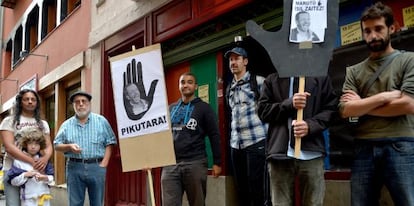Basque government’s €616 welfare checks spark immigration row in Vitoria
City’s conservative mayor says subsidy discourages North African residents from working


“If anybody commits fraud, it’s to feed their children, not to put money in a Swiss bank account,” notes Mohammed Satglarhezal, 37, a Moroccan who has been living in Spain for nearly 20 years, the last two in the Basque capital of Vitoria.
Satglarhezal receives no financial assistance from the Basque government. But 22 percent of all natives of the Maghreb area residing in Álava province do collect a monthly check for €616 to meet basic living requirements, a fact that has led the conservative Popular Party (PP) to claim that the aid is attracting people who wish to live on welfare rather than work.
Last July, a record 65,568 people received the Renta General de Ingresos (RGI), which the Basque government hands out to Spanish nationals and foreign residents alike, provided they meet certain requirements. Financial aid in the Basque region is higher than elsewhere in Spain.
Migrant numbers in the Basque Country fell for the second year in a row in 2013
Vitoria Mayor Javier Maroto said last month that foreign communities such as the Moroccans and Algerians are “mostly living on welfare and don’t want to work.”
His party backs him, while immigrant support groups are calling Maroto a “xenophobe” and “reactionary,” and asking for him to be declared “persona non grata.”
Basque immigration data partly debunks the pull-effect theory, since migrant numbers fell for the second year in a row in 2013. The Basque Country ranks fifth on the list of Spanish regions with the lowest immigration (6.4 percent of the Basque population).
The city of Vitoria says that 59 percent of Moroccans registered on the local rolls are collecting city welfare checks, a figure that rises to 72 percent for Nigerians.
Eligibility for RGI got tougher in 2011, when a reform established that recipients have to be registered for at least three years, rather than six months.
Vitoria says 59 percent of Moroccans registered on the local rolls are collecting welfare checks
“We came to the Basque Country because there were more jobs here than elsewhere in Spain,” says Satglarhezal. “How can you create a pull effect when people have to pay €500 in rent for at least three years before getting the aid?”
The head of the provincial authority and secretary general for the Álava PP, Javier de Andrés, is asking for a limit to aid so that “it is not guaranteed for life.”
A study for the Basque ombudsman shows that just seven percent of foreigners receive aid for more than six years, while that figure shoots up to 43 percent among Spanish nationals.
Although aid recipients are expected to follow training courses and accept job offers, a lack of oversight means that fraud is possible, admitted several recipients. Sources at Lanbide, the Basque employment center, said that “some people do not make an effort to get ahead, but that happens with all nationalities.”
The Basque government said that fraud only amounts to one percent of all beneficiaries.
Tu suscripción se está usando en otro dispositivo
¿Quieres añadir otro usuario a tu suscripción?
Si continúas leyendo en este dispositivo, no se podrá leer en el otro.
FlechaTu suscripción se está usando en otro dispositivo y solo puedes acceder a EL PAÍS desde un dispositivo a la vez.
Si quieres compartir tu cuenta, cambia tu suscripción a la modalidad Premium, así podrás añadir otro usuario. Cada uno accederá con su propia cuenta de email, lo que os permitirá personalizar vuestra experiencia en EL PAÍS.
¿Tienes una suscripción de empresa? Accede aquí para contratar más cuentas.
En el caso de no saber quién está usando tu cuenta, te recomendamos cambiar tu contraseña aquí.
Si decides continuar compartiendo tu cuenta, este mensaje se mostrará en tu dispositivo y en el de la otra persona que está usando tu cuenta de forma indefinida, afectando a tu experiencia de lectura. Puedes consultar aquí los términos y condiciones de la suscripción digital.








































